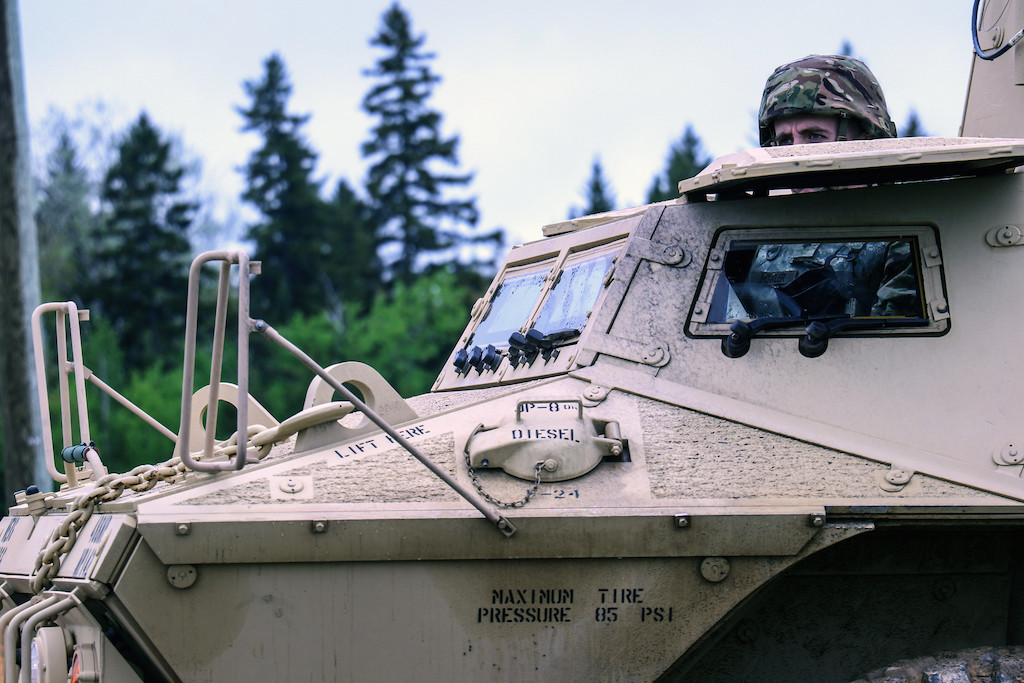“We are at a pivotal moment in the green transformation,” Finance Minister Chrystia Freeland told the House of Commons while releasing the 2021 federal budget. “We can lead, or we can be left behind. Our government knows that the only choice for Canada is to be in the vanguard.”
The budget provides $17.6 billion in new spending to cut greenhouse gas emissions and shift to a low-carbon economy by supporting “industrial transformation” and spending money to attract private investment in “clean technology.”
So far, environmentalists have been largely unenthusiastic.
As Sven Biggs at Stand.earth pointed out, the budget shows the Trudeau government “investing in programs to cut emissions in one breath, and announcing new financial support and tax breaks for some of the worst climate polluters in the next.”
Some of “the worst climate polluters” can be found in an aspect of the budget that has received very little attention so far — ignored even by climate groups.
Funding the military
As far as I can determine, CBC News‘ Murray Brewster is the only mainstream reporter who has searched through the more-than 700-page document to find the funding for Canada’s Department of National Defence (DND).
We tend to forget that all those fighter jets, tanks, naval vessels, air transport vehicles, Jeeps, helicopters, Humvees and drones burn massive amounts of oil, diesel and gas, and are major climate polluters. Indeed, as I documented in a 2020 article for Watershed Sentinel, across the planet, the world’s military is by far the largest single producer of greenhouse gas emissions.
Although Brewster mainly focuses on the $250 million to tackle sexual misconduct in the institution, he does find:
“Separately, the Liberal government plans to put $163 million over five years into the modernization of continental defence. Of that sum, $111 million is being set aside to revitalize NORAD, the North American Aerospace Defence Command.”
The budget:
“[a]lso earmarked $88 million over five years to maintain existing radar stations and northern defence infrastructure. The budget commits to spending $847.1 million over five years to maintain Canada’s rotating deployments of frigates and fighter jets to NATO, and more cash to cover increased contributions to the military alliance’s overall budget.”
By my calculations, that comes to $1,098.1 million, or more than a billion dollars in new funding for DND over the next five years.
Let’s not forget the $62 billion in new funding for DND that the Trudeau Liberals promised in 2019, which raised Canada’s military spending over the next 20 years to a whopping $553 billion. Now they’re adding an extra billion to the tab.
Some of that money will go to purchase 88 new fighter jets and 15 new warships. Boeing, Lockheed Martin, and Saab are in fierce competition for the fighter jet contracts, with the federal cabinet’s decision imminent.
Advancing militarism
In 2018, rabble.ca’s Ole Hendrickson warned that the Trudeau Liberals’ endorsement of nuclear energy as “clean power” is meant to “perpetuate the military industrial complex,” which “needs nuclear power and nuclear weapons just as much as it needs fossil fuels.”
Not only are the Liberals greenwashing nuclear power and trying to revive a dying industry, they are advancing militarism, in step with U.S. desires. Perhaps that shouldn’t surprise us, as Freeland is well-known as an anti-Putin hawk.
Besides nuclear, the military-industrial complex also needs cobalt and rare-earth metals for many of its advanced weapons. So now we can begin to see the reason behind the push for small modular reactors used in off-grid mining in Canada. We’re being told the cobalt and other minerals will mainly be for electric vehicles, but in reality the U.S. is desperate for the minerals for weaponry.
The minerals have been deemed “critical for national defence” by Washington — necessary for armoured vehicles, precision-guided missiles, smart bombs, storage and other batteries, night-vision goggles, aircraft, disk-drive motors in tanks, lasers, satellite communications, as well as radar and sonar on submarines and ships.
That is why the U.S. is securing supply chains with Canada in order to obtain these metals.
But there is another aspect to this climate story that must be mentioned, especially as world leaders come together at a leaders’ climate summit hosted by U.S. President Joe Biden Thursday and Friday this week.
The elephant in the room
As I documented in my Watershed Sentinel piece, at the 1997-1998 negotiations for the Kyoto Accord on climate — also known as the COP4 negotiations — the U.S. insisted that the Pentagon be exempted from all international climate agreements, as a national security provision. As a result, all U.S. military operations worldwide and within the U.S. are exempt from carbon emission measurement or reduction. Moreover, the U.S. military insisted in 1998 that at all future formal discussions on climate, delegates are actually prevented from discussing the military’s carbon bootprint.
But it gets even worse.
During those same 1997-1998 negotiations, the U.S. obtained an exemption for all countries’ militaries from having to report, or cut, their carbon emissions. That exemption was obtained after then U.S. vice-president Al Gore joined the American negotiating team in Kyoto.
While the rest of us try to transition to a low-carbon future, the military has carte blanche to burn all the fossil fuels it wants in its hardware for never-ending wars.
In a cynical move just days ago, Al Gore congratulated Freeland and Trudeau on the budget and stated that “we need other leaders to step up also.”
If Joe Biden, Justin Trudeau, and the other politicians at the leaders’ climate summit had any backbone, they would cancel the military exemption that has been in existence for 23 years, start counting military emissions in their national reporting, take major steps to cut those emissions by drastically winding down military procurement, cut defence budgets, and privilege diplomacy over war games.
I guess it’s up to the rest of us to insist on this.
Freelance writer Joyce Nelson is the author of seven books. She can be reached via www.joycenelson.ca
Image credit: The National Guard/Flickr




